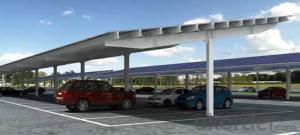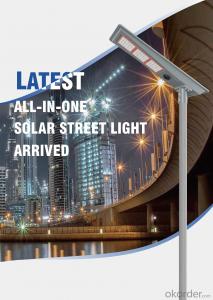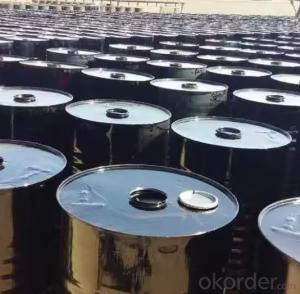solar carport system single pile
- Loading Port:
- China Main Port
- Payment Terms:
- TT OR LC
- Min Order Qty:
- -
- Supply Capability:
- -
OKorder Service Pledge
Quality Product, Order Online Tracking, Timely Delivery
OKorder Financial Service
Credit Rating, Credit Services, Credit Purchasing
You Might Also Like
Product Features
• No location limitation
• Simple structure, easy & quick installation
• Use standard components, low maintenance cost
• Easy to be packaged, minimized transportation cost
• Removable & reusable
• With waterproof & non-water proof solutions for choice
• Customization available
- Q:How much space is needed for installing a solar energy system?
- The amount of space needed for installing a solar energy system depends on various factors such as the size and type of the system, the energy requirements, and the available sunlight. Generally, a small residential solar energy system can be installed on rooftops or in a backyard with an area of about 100-400 square feet, while larger systems for commercial or industrial use may require several acres of land. It is important to conduct a site assessment to determine the suitable space for installation based on individual needs and local conditions.
- Q:Can solar energy systems be used for powering recreational vehicles or boats?
- Yes, solar energy systems can definitely be used for powering recreational vehicles (RVs) or boats. In fact, solar power is becoming increasingly popular in the RV and boating communities due to its numerous advantages. Solar panels can be installed on the roofs of RVs or boats to capture sunlight and convert it into electricity. This electricity can then be used to power various appliances and systems on board, such as lights, refrigerators, air conditioners, and even charging devices. The primary benefit of using solar energy for RVs and boats is that it provides a clean and renewable source of power. By harnessing the sun's energy, users can significantly reduce or even eliminate their reliance on traditional fossil fuel generators. This not only helps to reduce carbon emissions and minimize the impact on the environment but also saves money on fuel costs in the long run. Furthermore, solar power systems are highly flexible and can be customized to suit the specific energy needs of RVs and boats. They can be designed to be portable and easily deployed, allowing users to take advantage of solar energy wherever they go. Additionally, advancements in solar technology have made panels more efficient and durable, ensuring reliable power generation even in challenging weather conditions. It is important to note that the size and capacity of the solar energy system should be carefully considered to meet the energy requirements of the RV or boat. The number of solar panels and batteries needed will depend on factors such as the size of the vehicle or vessel, the amount of energy consumption, and the desired level of self-sufficiency. In conclusion, solar energy systems are a viable and sustainable option for powering recreational vehicles and boats. They offer numerous benefits, including reduced reliance on fossil fuels, cost savings, and environmental friendliness. With advancements in technology, solar power is becoming increasingly accessible and efficient, making it an attractive choice for those seeking to power their RVs or boats with renewable energy.
- Q:Are there any risks of electrical shocks during installation or maintenance of solar energy systems?
- During the installation or maintenance of solar energy systems, one must be aware of the risks of electrical shocks. These systems involve working with electrical components, such as solar panels, inverters, and batteries, which carry high voltage. Failure to follow proper safety measures can result in contact with live electrical parts and the possibility of receiving an electrical shock. Several factors can contribute to the risk of electrical shocks, including improper installation, insufficient knowledge or training in electrical systems, failure to use personal protective equipment (PPE), and inadequate grounding. It is crucial to adhere to safety guidelines and regulations when installing or maintaining solar energy systems. This includes wearing insulated gloves, using insulated tools, and ensuring proper grounding. Furthermore, working at heights during installation or maintenance introduces an additional hazard of electrical shocks. Care must be taken to prevent falls or accidental contact with live electrical parts while working on rooftops or elevated areas. To minimize the risks of electrical shocks, it is advisable to hire qualified and trained professionals for the installation and maintenance of solar energy systems. Regular inspections and maintenance checks should also be conducted to identify and address any potential electrical hazards. In conclusion, while solar energy systems offer many benefits, it is vital to be aware of the potential risks of electrical shocks and take the necessary precautions to ensure the safety of individuals involved in the installation or maintenance process.
- Q:How do solar energy systems handle excess power generation?
- Solar energy systems handle excess power generation through a process called net metering. When the system generates more electricity than is being used, the excess power is sent back to the grid, and the owner receives credits for the excess electricity. These credits can then be used during times when the system is not generating enough power, such as at night or during cloudy days, allowing for a more balanced and efficient use of solar energy.
- Q:Are there any noise or vibration issues with solar energy systems?
- No, noise and vibration issues are minimal with solar energy systems as they have no moving parts.
- Q:Are solar energy systems suitable for residential properties?
- Yes, solar energy systems are suitable for residential properties. They can efficiently generate electricity and provide homeowners with a clean and renewable energy source. Additionally, solar panels can be installed on rooftops, maximizing space utilization. With advancements in technology, solar energy systems have become more affordable, making them a viable option for residential properties.
- Q:Can solar energy systems be used in areas with limited roof access for maintenance?
- Solar energy systems can indeed be utilized in areas where roof access for maintenance is limited. Although the usual practice is to install solar panels on rooftops for maximum exposure to sunlight, there are alternative choices to consider. One option is to install ground-mounted solar panels in areas where roof access is restricted, making maintenance and cleaning tasks simpler. Furthermore, solar panel systems can be integrated into other structures like carports or pergolas, offering an alternative approach to the conventional rooftop installations. These alternatives guarantee the effective utilization of solar energy systems in areas with limited roof access for maintenance.
- Q:Can a solar energy system be installed in an area with high pollution levels?
- Indeed, it is feasible to install a solar energy system in a region with elevated pollution levels. Though the efficiency of solar panels may be compromised by pollution, it does not impede their installation or functioning entirely. Solar panels are engineered to endure diverse environmental circumstances, including air pollution. Although pollution may diminish the sunlight that reaches the panels, advancements in solar technology have enhanced their durability and capability to operate even in suboptimal conditions. Additionally, the implementation of solar energy systems in polluted areas can assist in alleviating the environmental consequences of pollution by offering a pristine and sustainable energy source.
- Q:Can solar energy systems be used for powering wastewater treatment plants?
- Absolutely, wastewater treatment plants can definitely utilize solar energy systems for power. To generate electricity, solar panels and other solar energy systems can be installed on the rooftops or in open areas surrounding the treatment plants. This generated electricity can then be utilized to power the various components and processes involved in wastewater treatment, including pumps, motors, blowers, and filtration systems. Using solar energy for wastewater treatment plants brings several advantages. Firstly, it is an environmentally friendly and sustainable energy source, helping to reduce the carbon footprint and environmental impact of these facilities. Solar energy systems produce electricity without releasing any greenhouse gases or pollutants into the air, making them an excellent choice for preserving the environment. Secondly, solar energy systems can provide a consistent and dependable power supply to the treatment plants. The availability of sunlight is generally predictable, and advancements in solar technology have enabled the storage of excess energy in batteries for use during cloudy days or at night. This ensures uninterrupted operation of the wastewater treatment plants, even in areas with unreliable grid connections or frequent power outages. Moreover, solar energy systems can also contribute to cost reduction for wastewater treatment plants. By generating their own electricity, these facilities can potentially decrease their reliance on the grid, resulting in substantial savings on energy bills. Additionally, solar energy systems require minimal maintenance and have a long lifespan, leading to further cost savings over time. In conclusion, solar energy systems can be effectively utilized for powering wastewater treatment plants. They provide a clean, dependable, and cost-effective solution that not only reduces the environmental impact but also offers energy independence to these crucial facilities.
- Q:How do I maintain and clean my solar energy system?
- To ensure the proper maintenance and cleanliness of your solar energy system, it is crucial to adhere to several important steps: 1. Conduct Regular Inspections: It is important to regularly inspect your solar panels to ensure they remain in optimal condition. Look out for any indications of damage, such as cracks or loose connections. Additionally, check for the accumulation of debris or leaves on the panels. 2. Periodic Cleaning: Cleaning your solar panels on a regular basis is necessary to maintain their efficiency. Begin by removing any loose debris, including leaves or dirt, using a soft brush or a leaf blower. Next, gently scrub the panels with a mixture of mild soap and water, using a non-abrasive sponge or cloth. Avoid the use of harsh chemicals or abrasive materials that may harm the panels. 3. Prioritize Safety: Always prioritize safety when engaging in solar panel cleaning. Before commencing any maintenance work, ensure that you turn off the system and disconnect it from the electrical grid. If your solar panels are installed on the roof, utilize appropriate safety equipment, such as a harness or ladder, to prevent accidents. 4. Seek Professional Assistance: It is advisable to schedule professional maintenance at least once annually. Professional technicians possess the necessary expertise and tools to identify potential issues, conduct comprehensive inspections, and perform any required repairs. This ensures that your solar energy system operates optimally. 5. Regularly Monitor Performance: It is essential to regularly monitor the performance of your solar energy system. Many solar inverters come equipped with monitoring systems that enable you to track energy production. This enables you to promptly address any decrease in efficiency. 6. Address Shading: Trim any trees or shrubs that may cast shade on your solar panels on a regular basis. Shading can significantly diminish the efficiency of your system, so it is crucial to ensure that your panels receive maximum sunlight. By adhering to these maintenance and cleaning practices, you can ensure that your solar energy system remains in optimal condition, thereby maximizing its efficiency and lifespan.
1. Manufacturer Overview |
|
|---|---|
| Location | |
| Year Established | |
| Annual Output Value | |
| Main Markets | |
| Company Certifications | |
2. Manufacturer Certificates |
|
|---|---|
| a) Certification Name | |
| Range | |
| Reference | |
| Validity Period | |
3. Manufacturer Capability |
|
|---|---|
| a)Trade Capacity | |
| Nearest Port | |
| Export Percentage | |
| No.of Employees in Trade Department | |
| Language Spoken: | |
| b)Factory Information | |
| Factory Size: | |
| No. of Production Lines | |
| Contract Manufacturing | |
| Product Price Range | |
Send your message to us
solar carport system single pile
- Loading Port:
- China Main Port
- Payment Terms:
- TT OR LC
- Min Order Qty:
- -
- Supply Capability:
- -
OKorder Service Pledge
Quality Product, Order Online Tracking, Timely Delivery
OKorder Financial Service
Credit Rating, Credit Services, Credit Purchasing
Similar products
New products
Hot products
Related keywords




























